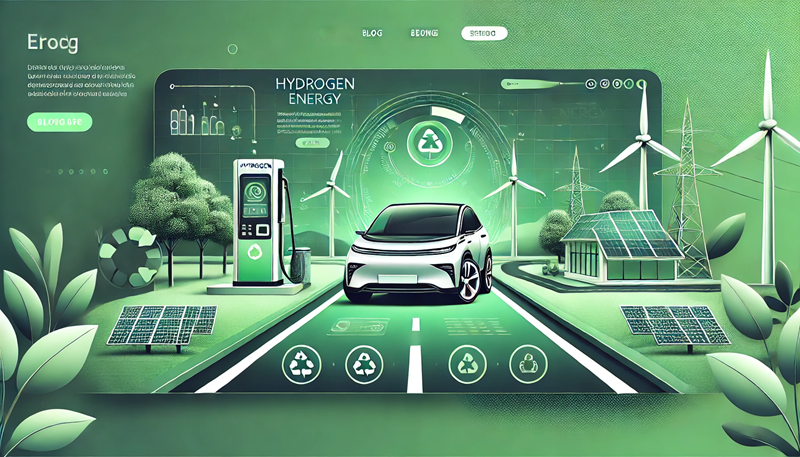Hydrogen-powered vehicles have long been positioned as a breakthrough in clean energy transportation, promising zero emissions, fast refueling, and energy efficiency. But behind the marketing hype, are they really as sustainable and practical as advertised? Or is hydrogen a costly distraction from more viable green technologies, such as battery electric vehicles (BEVs)?
Despite billions of dollars in investments from global automakers and governments, hydrogen cars remain a niche product with limited adoption. From high costs and infrastructure challenges to energy inefficiencies and geopolitical factors, we’ll explore whether hydrogen-powered cars are truly a clean energy revolution or a well-executed marketing campaign.
Hydrogen Cars vs. Reality: The Clean Energy Debate
At first glance, hydrogen-powered cars (FCEVs) appear to be a perfect solution for sustainable mobility:
✅ Zero emissions – Hydrogen fuel cells only produce water vapor.
✅ Fast refueling – Hydrogen cars can refuel in under 5 minutes, compared to the longer charging times of BEVs.
✅ Potential for renewable hydrogen – “Green hydrogen” can be produced from wind, solar, and hydroelectric power.
However, the reality is far more complex. The production, distribution, and usage of hydrogen fuel involves major inefficiencies, making FCEVs much less sustainable than many believe.
🚨 Key Challenges:
❌ High energy losses – Hydrogen production is energy-intensive.
❌ Limited infrastructure – Refueling stations are rare and costly to build.
❌ Expensive technology – Hydrogen cars cost more than BEVs and remain unaffordable for most consumers.
1. The Energy Efficiency Problem: Why Hydrogen Cars Waste More Power
One of the biggest scientific drawbacks of hydrogen-powered cars is energy inefficiency. Unlike battery electric vehicles (BEVs), which directly store and use electricity, hydrogen cars require multiple energy conversion steps, resulting in major energy losses.
🔋 Energy Efficiency Comparison:
- BEVs convert 80% of electricity into motion.
- Hydrogen FCEVs convert only 30-40% into actual movement.
🔍 How Hydrogen Energy is Wasted:
- Electrolysis: Creating hydrogen from water loses 30-40% of energy.
- Compression & Storage: Hydrogen must be compressed and cooled, wasting another 10-15%.
- Fuel Cell Conversion: Inside the car, converting hydrogen into electricity loses another 40%.
This means that BEVs require much less electricity to operate—making them the more energy-efficient and sustainable choice.
2. Hydrogen Fuel Isn’t as “Green” as It Seems
While hydrogen itself is a clean-burning fuel, the way it is produced matters. There are three main types of hydrogen:
⚠️ “Grey Hydrogen” (Most Common – Dirty & Polluting)
🔹 Produced using fossil fuels (natural gas).
🔹 Creates CO₂ emissions, contributing to global warming.
🔹 90% of today’s hydrogen is made this way.
⚠️ “Blue Hydrogen” (Slightly Better, But Still Polluting)
🔹 Also made from fossil fuels, but CO₂ is partially captured.
🔹 Still generates emissions, making it not truly green.
✅ “Green Hydrogen” (Truly Sustainable – But Expensive)
🔹 Made using electrolysis powered by wind, solar, or hydro energy.
🔹 Zero CO₂ emissions, but very costly.
🔹 Accounts for less than 1% of global hydrogen production.
🚨 Reality Check: Most hydrogen-powered cars run on grey hydrogen, making them no better than gasoline cars in terms of emissions!
3. The Cost Factor: Are Hydrogen Cars Too Expensive?
💰 Hydrogen fuel cell vehicles (FCEVs) remain significantly more expensive than both gasoline cars and BEVs due to costly production processes.
Vehicle Costs Comparison:
| Vehicle | Starting Price | Fuel Type |
|---|---|---|
| Toyota Mirai (FCEV) | $50,000+ | Hydrogen |
| Hyundai Nexo (FCEV) | $60,000+ | Hydrogen |
| Tesla Model 3 (BEV) | $40,000 | Battery Electric |
| Chevy Bolt EV (BEV) | $27,495 | Battery Electric |
Hydrogen cars cost thousands more than BEVs, making them less competitive.
Hydrogen vs. Electricity: Fuel Cost Comparison
🔹 Hydrogen fuel is expensive—in California, filling up a hydrogen car can cost over $80 per tank, while charging an EV costs under $10.
🔹 BEVs are far cheaper to run—electricity prices are more stable and widely available.
🚨 Key Takeaway: Hydrogen cars are too expensive for most consumers, both in vehicle price and fuel costs.
4. Global Perspectives: Hydrogen’s Future in Developed vs. Developing Nations
Developed Countries: Governments Are Divided
🔹 Japan & South Korea – Investing heavily in hydrogen fuel cell technology, but struggling to gain mass adoption.
🔹 Germany & EU – Shifting focus towards BEVs, but still funding hydrogen for commercial transport.
🔹 USA – Only 60 hydrogen refueling stations, compared to 145,000 EV chargers nationwide.
Developing Countries: Hydrogen Adoption is Even Harder
🚨 Why Hydrogen Faces More Challenges in Developing Nations:
❌ High production & infrastructure costs.
❌ Limited government subsidies.
❌ Stronger focus on electric mobility (BEVs).
📌 India & China are investing in hydrogen for industrial applications but favor BEVs for consumer transport.
5. Geopolitical & Political Stability Factors
💡 Hydrogen fuel is deeply tied to politics and energy independence.
🚀 Countries with abundant renewable energy (Norway, Canada, Australia) can produce green hydrogen sustainably.
⚠️ Oil-rich nations (Middle East, Russia) are hesitant to shift away from fossil fuel-based hydrogen.
💰 Government policies dictate hydrogen’s future—while some subsidize hydrogen heavily, others prioritize BEVs as the more practical option.
📌 Key Takeaway: Hydrogen adoption depends on political will and economic stability, making it less reliable than electric vehicle growth.
Conclusion: Is Hydrogen a Clean Energy Revolution or Clever Marketing?
✅ Hydrogen fuel cells work—but they’re not the best clean energy solution for personal vehicles.
✅ BEVs are cheaper, more efficient, and easier to scale.
✅ Hydrogen is more viable for commercial transport (trucks, buses, trains, ships).
🚀 The future of clean transport belongs to BEVs, while hydrogen may play a role in industrial applications and heavy transport.
🔍 Final Verdict? Hydrogen cars are not truly green yet, and their costs and inefficiencies make them a harder sell compared to BEVs. For now, they remain more of a marketing promise than a practical reality.
💬 What do you think? Will hydrogen ever catch up to BEVs? Share your thoughts! 🚗💨
